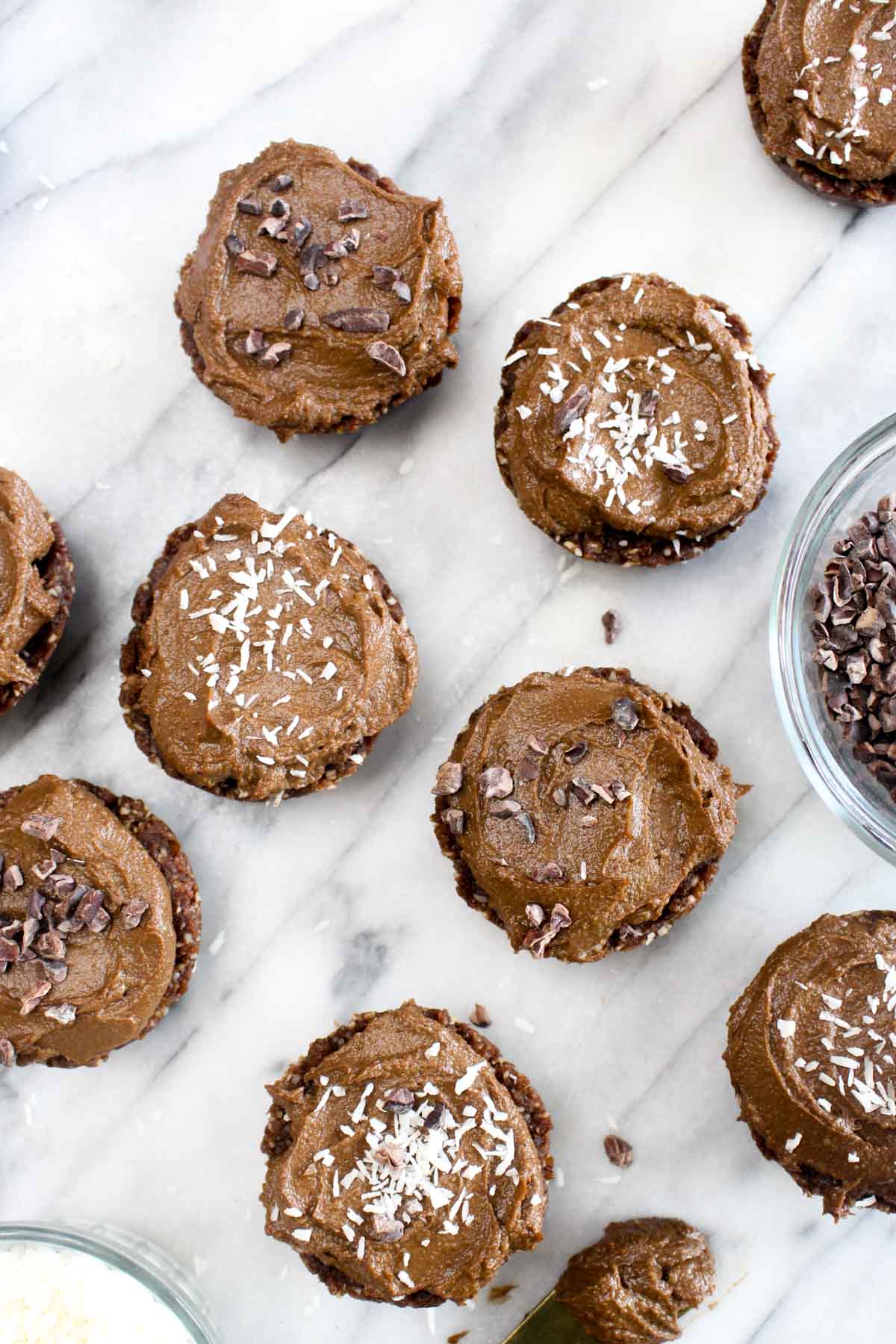Adaptogens.
Adapto-what?
Have you heard of this weird category of superfoods?
They have been buzzing around the internet promising to improve health, mood, and stress levels. When I first heard of the powers of these superfoods, I immediately said, "sign me up!" I am always on the lookout for health trends to research, so I jumped onto Amazon and bought myself a big ol' book. The book was dry, and downright boring, but I sure learned a thing or two! Thankfully, there were a few info graphics and pictures which saved my brain from post-college shutdown along the way. In attempts to spare you long nights of textbook style reading, I have compiled this post to get you all the info with none of the yawns.
If you have ever wondered "what are adaptogens," what they can do for you, and what the heck you can do with them, read on, friend. Welcome to the strange (and beautiful!) world of adaptogens.
Oil Free Bulletproof Coffee with added Mucuna Prurienes and Eleuthero.
What are Adaptogens : A Little Background
The short definition is that adaptogens are herbs, roots, and mushrooms that can help your body achieve homeostasis or its intended balance.
Because of this, adaptogens can be used to treat opposing conditions in many cases. For example, men and women looking to balance their hormones will often both be prescribed rhodiola. Though our hormonal needs are different, this herb can improve both systems. Adaptogens seem to have the ability to nourish systems as a whole and bringing them back into balance, regardless of the need. That being said, some adaptogens are more beneficial for certain conditions than others.
Another example is that ashwaganda can improve thyroid function if you have an overactive thyroid (hyper) OR an under active thyroid (hypo). In both cases, this adaptogen brings the thyroid back into balance.
What are Adaptogens : What Can Adaptogens do for You
If you find yourself thinking: So, we've learned that adaptogens can help the body achieve balance, but what exactly does that mean? That sounds great and all, but what are the benefits?
Good question. Good good question.
The official answer: SO MANY THINGS!
Adaptogens are often touted for their ability to reduce stress. And for gosh darn good reason! Who couldn't use a little more zen in their lives. If you just said no to that, you have this life thing figured out, and please please send me an email sharing all of your secrets. Okay? Okay.
But for the rest of us (and a special hello my fellow type A's!), a little less stress sounds like a dream.
Not only can adaptogens help reduce emotional stress, they can reduce all types of stress. This stress caused to our bodies by environmental toxins like air pollution, EMF frequencies, and excess sun exposure. Physical stress caused by intense exercise, sleep deprivation, or overstimulation. Then there are biological stressor such as bacteria, viruses, or molds that we might come into contact with. And finally nutritional stress when we eat processed food, something we are allergic to, or consume too much alcohol.
The bottom line, our bodies can be stressed out by a lot of things, a lot of the time. Most of this is unavoidable, because we have gotta live this thing called life! But, the good news is, adaptogens can help cure whatever your stressor of the moment is. They can regulate stress hormones, improve immune function, and pacify our nervous system so we can keep on keeping on. In addition to their stress busting superpowers, which leads to overall health, they can also give us a boost in vitality and stamina.
There are also specific adaptogens that are best at supporting certain systems. From digestive distress and hormone balance, to athletic recovery and heart health, there is an adaptogen for whatever ails you. As I am not a doctor, I recommend doing research to find the adaptogens that are the best fit for you.
What are Adaptogens: Adaptogens I Frequently Use
Maca is a root that hails from Peru that is all around great for balancing female hormones - no matter what stage of life you are in. It is very pleasant in flavor (not a given with all adaptogens) and tastes very similar to malt. (Healthy milkshake anyone?!) It is naturally sweet and makes a great addition to smoothies, or my Superfood Maca Latte.
Reishi is known as the Queen of all Chinese Herbs. Clearly, this mushroom has some serious health benefits. Reishi can boost our immune system, relieve stress, and improve recall and memory. Reishi is bitter in flavor, and is often added to coffee. I like to use it in my Raw Reishi Brownies.
Mucuna Pruriens is an adaptogen with big benefits for the nervous system and brain. It can fight brain degeneration and increase overall memory and recall. It can also pacify the nervous system, relieve stress, and improving nerve function. I add Mucuna Prurienes to my Oil Free Bulletproof Coffee when I feel a little foggy and need to focus. This is one of those adaptogens that I can feel working. It gets me focused and sharp to take on the day.
Eleuthero is a great adaptogen for athletes. It can improve endurance, stamina, and reduce recovery time. It can also lower cholesterol and reduce hypertension. It will improve sleep quality, helping us to sleep through the night without waking. I occasionally add eleuthero into a morning latte if I have had a tough workout the day before.
Tulsi (Holy Basil) was one of the first adaptogens I discovered and incorporated into my daily routine. I was working a stressful job, trying to keep my Crohn's disease at bay, and knew stress was causing most of my problems. Enter: Tulsi. This herb can increase immune function, reduce emotional stress, and improve symptoms of depression. It can even reduce the negative effects of radiation, so sip on a cup the next time you have an x-ray. I usually consume Tulsi in tea form throughout the day.
Pau d'Arco is a less commonly know adaptogen, but one that I use daily! Pau d'arco is an anti-inflammatory with big digestive benefits. It can help the body rid itself of candida, a bad yeast that stakes a claim in our guts. It is a bark that is most often used in tea. I use it in my Homemade Herbal Coffee and sip it almost daily.
Goji Berries are one of the easiest adaptogens to add to our daily diets! Unlike most adaptogens, which are bitter herbs whose flavors need to be masked, goji berries are just that, berries. They make a great snack with some nuts and taste great on top of oatmeal. Goji berries lower blood sugar levels, improve immune function, and reduce liver damage. I often add goji berries to my Superfood Cereal.
Herbal Coffee recipe with Pau d'Arco
Other What are Adaptogens? Where to Buy:
It is very important to purchase adaptogens from reputable sources. The better the source, the better the benefits. Since adaptogens are often consumed daily, we need to make sure they are completely pure and don't have contain any fillers or toxins. Nearly all common dietary supplements test positive for heavy metals and other toxins. Since we want these herbs to do more good than harm, it is incredibly important to only purchase them from reputable sources.
One thing to remember, adaptogens are expensive, but the dose is relatively small. I can go a good six months with near daily use from just one container.
Here are the companies I use:
Organic India (all of their teas use Tulsi/Holy Basil as a base)
Moon Juice (great targeted adaptogen blends if you don't know where to start)
Other What are Adaptogens? A few cautions:
Dosage: Adaptogens are one of those things where less is more. Adaptogens are potent, and should be consumed in small doses. Most adaptogens I use, I take in ¼ to ½ teaspoon doses per day, max. Start small, at ¼ teaspoon or less, and work your way up from there. It is also important to note, that you should only use 1-3 adaptogens in a given recipe. After that, your body will not absorb all the benefits. I limit my morning latte to 3 adaptogens, and then incorporate them into other parts of my day, if desired.
Pregnancy: If you are pregnant or breastfeeding, adaptogens might not be for you, at the moment. Please discuss adaptogen use with your doctor before getting started.
Trust your body: Yes, adaptogens, by definition, are foods that only help the body. They should have no side effects and are safe for use. That being said, if you take an adaptogen and have any side effects or just feel off, stop taking it. It could be that you started with too high of a dose, remember, less is more, or maybe you are just iIntolerant to the herb. Almonds are touted as healthy to boot, but I have an almond intolerance. Strange, but every time I snack on a few, I get a crazy stomach ache and a bloated belly that looks third trimester pregnant. Point being, listen to your body. No two are the same and you know yours best.
What are Adaptogens? Sources:
Winston, D., & Maimes, S. (2007). Adaptogens: herbs for strength, stamina, and stress relief. Rochester, VT: Healing Arts Press.
Dr. Edward Group DC, NP, DACBN, DCBCN, DABFM. "7 Benefits of Maca Root for Women."Dr. Group's Healthy Living Articles. Global Healing Center, Inc, 10 Sept. 2014. Web. 03 July 2017.
"Adaptogens: Herbs for All That Ails You?" @berkeleywellness. N.p., n.d. Web. 03 July 2017.
Yadav, S. K., J. Prakash, S. Chouhan, S. Westfall, M. Verma, T. D. Singh, and S. P. Singh. "Comparison of the Neuroprotective Potential of Mucuna Pruriens Seed Extract with Estrogen in 1-methyl-4-phenyl-1,2,3,6-tetrahydropyridine (MPTP)-induced PD Mice Model." Neurochemistry International. U.S. National Library of Medicine, Jan. 2014. Web. 03 July 2017.
Dvorkin-Camiel, L., and J. S. Whelan. "Tropical American Plants in the Treatment of Infectious Diseases." Journal of Dietary Supplements. U.S. National Library of Medicine, n.d. Web. 03 July 2017.
I am not a doctor, and the information in this article, What are Adaptogens, is not intended to diagnose illness or be used as a treatment plan. I am simply sharing my experience and knowledge with the hope that it might be able to give you a better understanding of adaptogens and how they can become a part of your own health journey.







Hi sweet,
Great, informative post on adaptogens, thanks!
Just a tiny comment: in the section where you describe Pau d'arco, you describe candida as a bacteria. It is actually a yeast/ fungus. :)
Hi Mic, You are absolutely right! Thank you for pointing that out.